The break up of Syria into five statelets was first proposed in Oded Yinon’s “a Zionist strategy for the nineteen eighties” in February 1982 and endorsed by the the World Zionist Congress held in Kivunim, Israel on that date. This policy proposal was further refined in the Israeli document entitled “a clean break, a new strategy for the realm” drafted in 1996 by Richard Perle, Douglas Feith, Meyrav and David Wurmser, J. Colbert & co.and became Netanyahu’s electoral campaign policy strategy. The same neocon (more appropriately Ziocon) authors reiterated the need for the destruction of Syria in their following strategy paper Project for a New American Century, 1999, which became official US foreign policy under Bush jnr.s’ administration and has been openly adopted by Obama. So what was originally an Israeli strategy is now US official foreign policy !
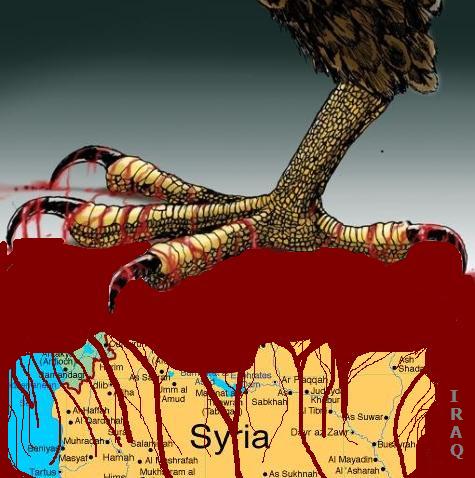
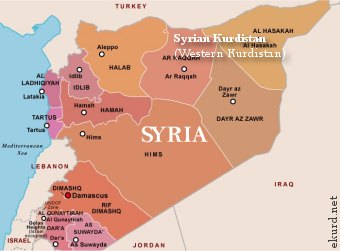
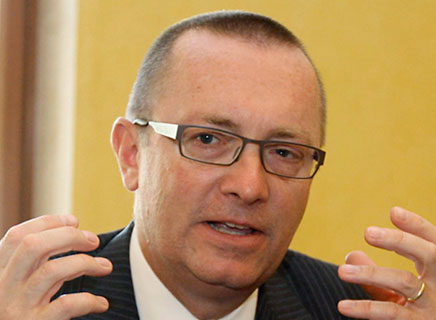

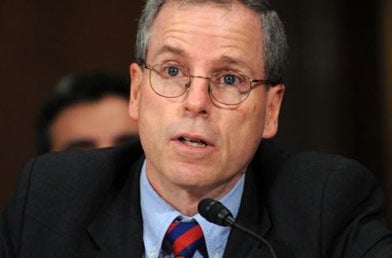
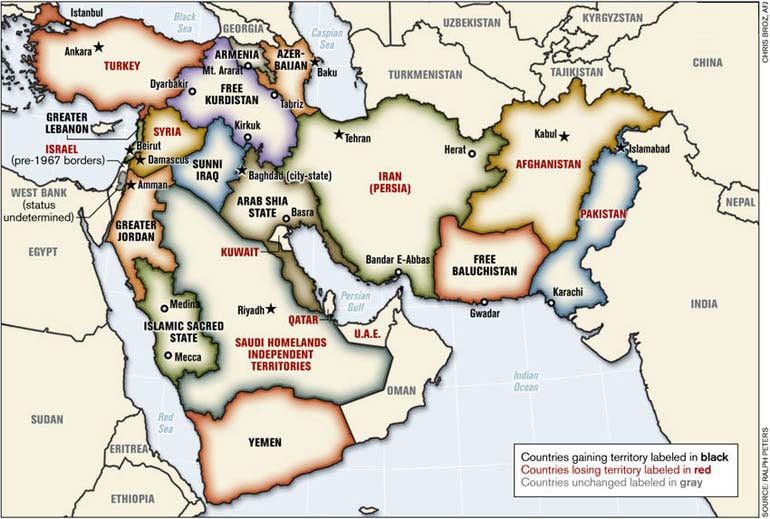
– Said Zulficar
A timely article in the Jerusalem Post last month brings to the forefront the unspoken objective of US foreign policy, namely the breaking up of Syria as a sovereign nation state –along ethnic and religious lines– into several separate and “independent” political entities. The article also confirms the role of Israel in the process of political destabilization of Syria. The JP article is titled: “Veteran Kurdish politician calls on Israel to support the break-up of Syria‘ (by Jonathan Spyer) (The Jerusalem Post (May 16, 2012)
The objective of the US sponsored armed insurgency is –with the help of Israel– to “Break Syria into Pieces”.
The “balkanisation of the Syrian Arab Republic” is to be carried out by fostering sectarian divisions, which will eventually lead to a “civil war” modelled on the former Yugoslavia. Last month, Syrian “opposition militants” were dispatched to Kosovo to organize training sessions using the “terrorist expertise” of the US sponsored Kosovo Liberation Army (KLA) in fighting the Yugoslav armed forces.
Sherkoh Abbas, President of the US based Kurdistan National Assembly of Syria (KNA) has “called on Israel to support the break-up of Syria into a series of federal structures based on the country’s various ethnicities.” (Ibid)

One possible ”break-up scenario” pertaining to Syria, which constitutes a secular multi-ethnic society, would be the formation of separate and “independent” Sunni, Alawite-Shiite, Kurdish and Druze states: “We need to break Syria into pieces,” Abbas said. (Quoted in JP, op. cit., emphasis added).
“The Syrian Kurdish dissident argued that a federal Syria, separated into four or five regions on an ethnic basis, would also serve as a natural “buffer” for Israel against both Sunni and Shi’ite Islamist forces.” (Ibid.).
Ironically, while Islamist forces are said to constitute the main threat to the Jewish State, Tel Aviv is providing covert support to the Islamist Free Syrian Army (FSA).

Meeting behind Closed Doors at the US State Department
A top level US State Department meeting was held in May with members of the Syrian Kurdish opposition. In attendance were representatives of the Kurdish National Council (KNC), Robert Stephen Ford, the outgoing US ambassador to Syria (who has played a key role in channelling support to the rebels) as well as Frederic C. Hof, a former business partner of richard armitage, who currently serves as the administration’s “special coordinator on Syria”. (Ibid). The delegation also met with Assistant Secretary of State for Near Eastern Affairs Jeffrey Feltman.
Frederic C. Hof, Robert Stephen Ford and Jeffrey Feltman are the State Department’s key Syria policy-makers, with close links to the Syrian Free Army (SFA) and the Syrian National Council (SNC).

Assistant Secretary of State for Near Eastern Affairs Jeffrey Feltman
Frederic C. Hof, The Administration’s “special coordinator on Syria”

Robert S. Ford, outgoing US Ambassador to Syria
The public statements of KNA leader Sherkoh Abbas in the wake of the State Department meeting suggest that the political fracturing of the Syrian Arab Republic along ethnic and religious lines as well as the creation of an “independent Kurdistan” were discussed. “State Department Deputy Spokesman Mark Toner described [the meeting's] purpose as part of ‘ongoing efforts… to help the Syrian [Kurdish] opposition build a more cohesive opposition to Assad.’” (Ibid).
The KNA leader called upon Washington to support the creation of a separate Kurdish State consisting of “an autonomous region in Syria; joining the Kurdistan Regional Government in Iraq – which borders the Kurdish region in Syria; or perhaps an even larger Kurdish state” [Greater Kurdistan]. “The Kurdish people, in all parts of Kurdistan, seek the right to form an independent Kurdish state.
We can only achieve this cherished goal with the help of the western democracies, and first and foremost the U.S.” said Sherkoh Abbas. (Syria: An Alternative, Choice, Ekurd.net, May 22, 2012)
It is worth noting, in this regard, that the creation of a “Greater Kurdistan” has been envisaged for several years by the Pentagon as part of a broader “Plan for Redrawing the Middle East”.(See map 2 below). This option, which appears unlikely in the near future, would go against the interests of Turkey, a staunch ally of both the US and Israel. Another scenario, which is contemplated by Ankara would consist in the annexation to Turkey of parts of Syrian Kurdistan. (See map above).
“Greater Kurdistan” would include portions of Iran, Syria, Iraq and Turkey as conveyed in Coronel Ralph Peters (ret) celebrated map of “The New Middle East” (see below). (For Further details see Mahdi Nazemroaya’s November 2006 Global Research article).
Colonel Peters taught at the US Military Academy.
- by Mahdi Darius Nazemroaya – 2006-11-18
TowaMap 2. The New Middle East
rds the balkanization (division) and finlandization (pacification) of the Middle East

The above map was prepared by Lieutenant-Colonel Ralph Peters. It was published in the Armed Forces Journal in June 2006,
Peters is a retired colonel of the U.S. National War Academy. (Map Copyright Lieutenant-Colonel Ralph Peters 2006).
Peters is a retired colonel of the U.S. National War Academy. (Map Copyright Lieutenant-Colonel Ralph Peters 2006).
Although the map does not officially reflect Pentagon doctrine, it has been used in a training program at NATO’s Defense College for senior military officers.
This map, as well as other similar maps, has most probably been used at the National War Academy as well as in military planning circles.
This map, as well as other similar maps, has most probably been used at the National War Academy as well as in military planning circles.














